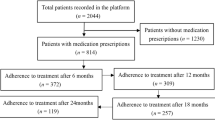Abstract
Since inhalation therapy will probably remain the preferred route of treatment for patients with chronic obstructive pulmonary disease (COPD), it is important to provide helpful information that may assist physicians and nurses in selecting the appropriate device(s) for individual patients as well as prescribing the correct medication. In line with the GOLD guidelines, the Aerosol Drug Management Improvement Team (ADMIT) propose a three-part “therapy adjustment strategy”, which provides health care professionals with a way to monitor and check the delivery of inhaled medication. The strategy is a summation of the key principles behind the evidence-based management of stable COPD and exacerbations. It offers physicians a rapid and user-friendly overview of the requirements of COPD management starting with making the diagnosis and continuing with optimisation of therapy in follow-up appointments. It includes everything from check lists for disease assessment and recommendations for reducing risk factors to selecting the proper inhalers and continuous checking of compliance and correct inhaler technique. These practical COPD therapy adjustment algorithms have been used as part of an interactive online course developed by the ADMIT group (www.admit-online.info). The COPD “flash” video available at this web site offers suggestions on how to organise a complete doctor-patient consultation.
Similar content being viewed by others
Article PDF
Author information
Authors and Affiliations
Consortia
Corresponding author
Ethics declarations
Competing interests
Marielle Broeders has acted as a consultant for Meda AB and GlaxoSmithKline.
Walter Vincken has acted as a consultant for Meda AB and spoken at conferences sponsored by Meda, Boehringer Ingelheim, GSK, Novartis and Menarini. WV has also received education grants from Altana/Nycomed, AstraZeneca, BI, GSK, Novartis, Pfizer, Meda and Chiesi.
Lorenzo Corbetta has acted as a consultant for GSK, AZ, BI/Pfizer, Merck Sharpe and Dohme, Meda, Novartis and UCB and spoken at conferences sponsored by Abbott, GSK, AZ, BI/Pfizer, Meda, Novartis, Zambon and UCB. LC has also received education grants from GSK, AZ, BI/Pfizer and research grants from GSK and AZ.
Conflicts of interest for all ADMIT members are listed at the end of the first paper in this series — see Dekhuijzen et al. Prim Care Respir J 2007;16(6):341–8.
Rights and permissions
About this article
Cite this article
EAC Broeders, M., Vincken, W., Corbetta, L. et al. The ADMIT series — Issues in Inhalation Therapy. 7) Ways to improve pharmacological management of COPD: the importance of inhaler choice and inhalation technique. Prim Care Respir J 20, 338–343 (2011). https://doi.org/10.4104/pcrj.2011.00062
Received:
Revised:
Accepted:
Published:
Issue date:
DOI: https://doi.org/10.4104/pcrj.2011.00062
This article is cited by
-
Exploring General Practitioners’ Preferences and Experience with Respiratory Inhaler Devices
Pulmonary Therapy (2022)
-
Efficacy of an educational intervention in primary health care in inhalation techniques: study protocol for a pragmatic cluster randomised controlled trial
Trials (2016)
-
Preference, satisfaction and critical errors with Genuair and Breezhaler inhalers in patients with COPD: a randomised, cross-over, multicentre study
npj Primary Care Respiratory Medicine (2015)
-
Impact of multiple-dose versus single-dose inhaler devices on COPD patients’ persistence with long-acting β2-agonists: a dispensing database analysis
npj Primary Care Respiratory Medicine (2014)



